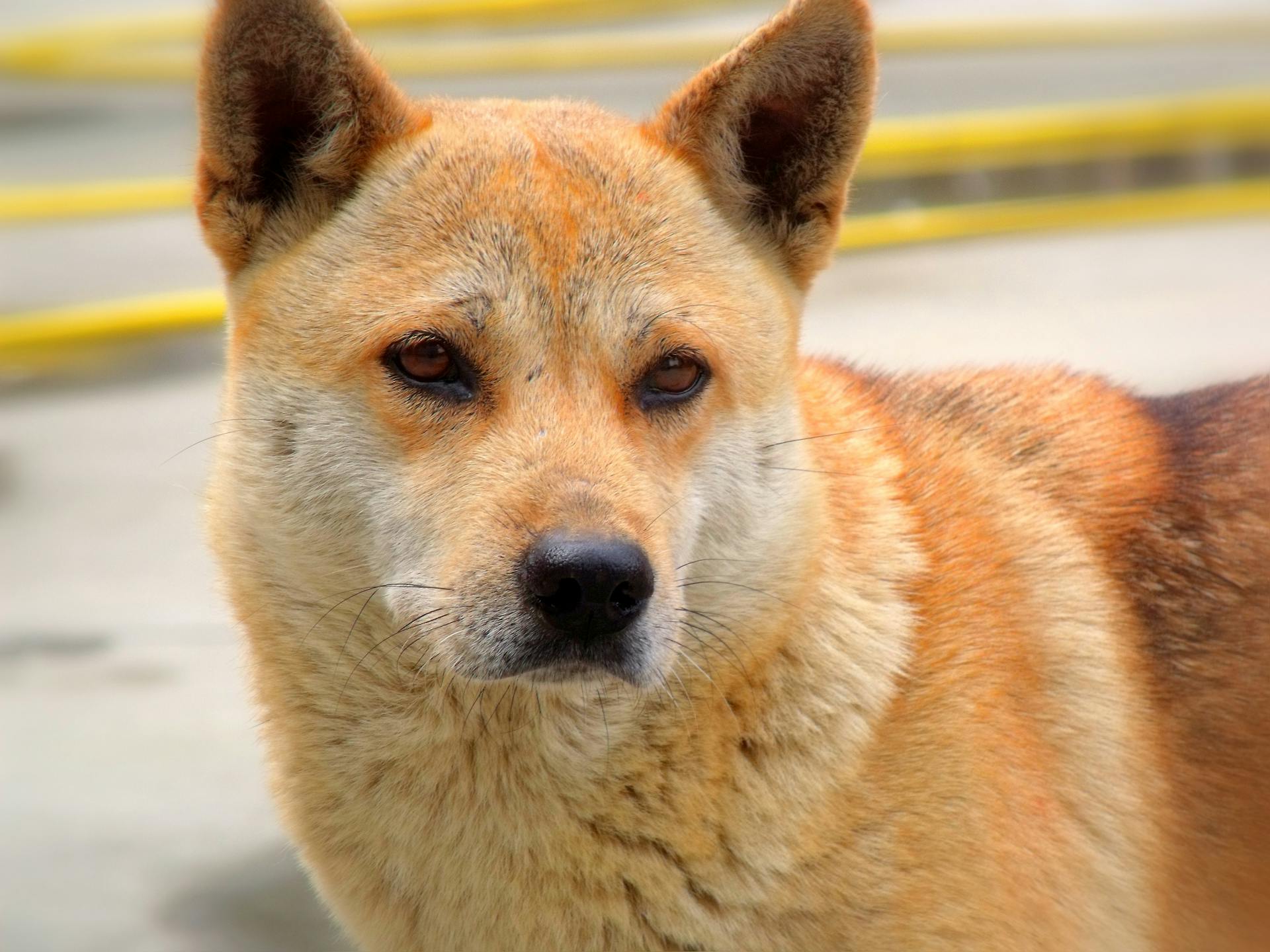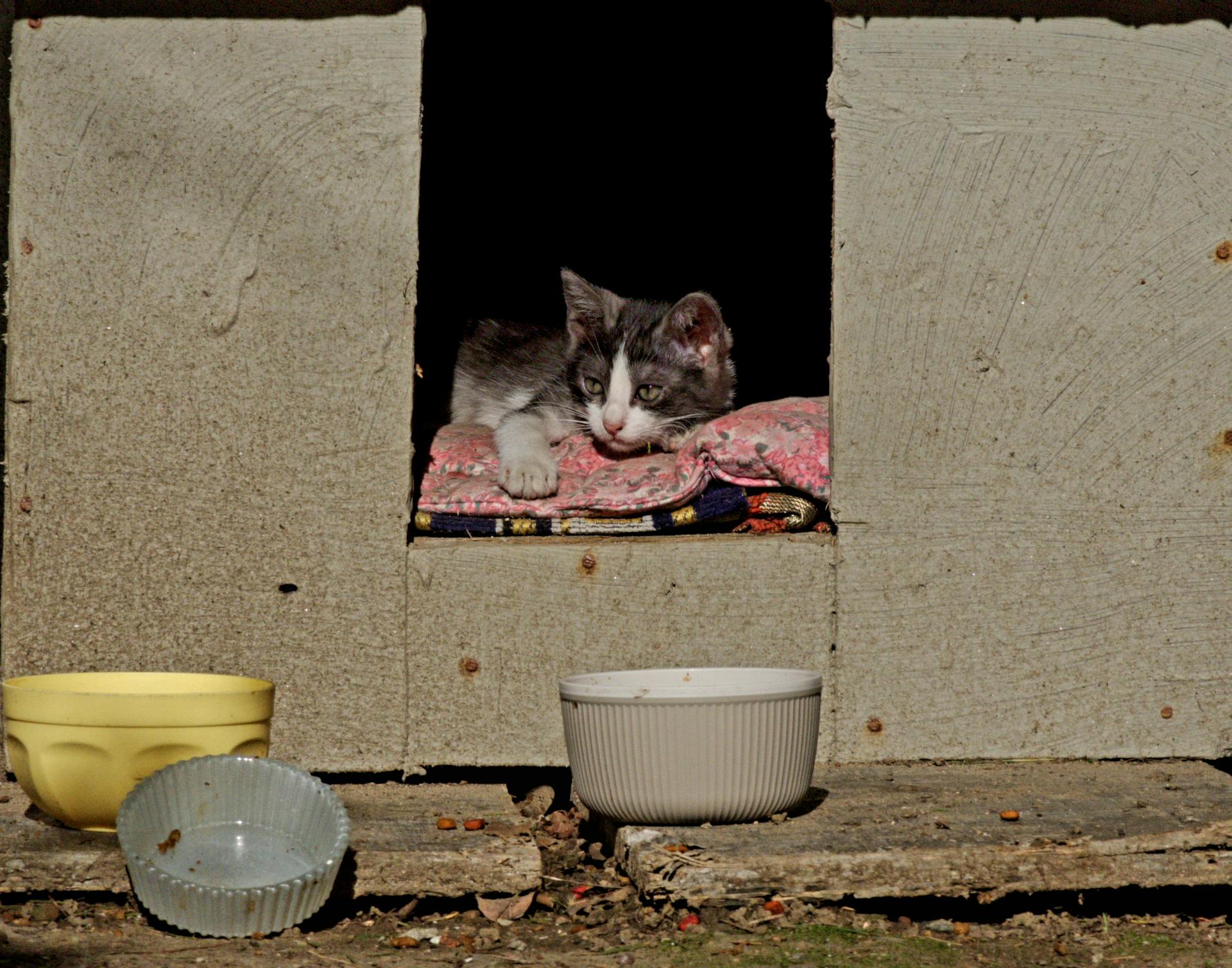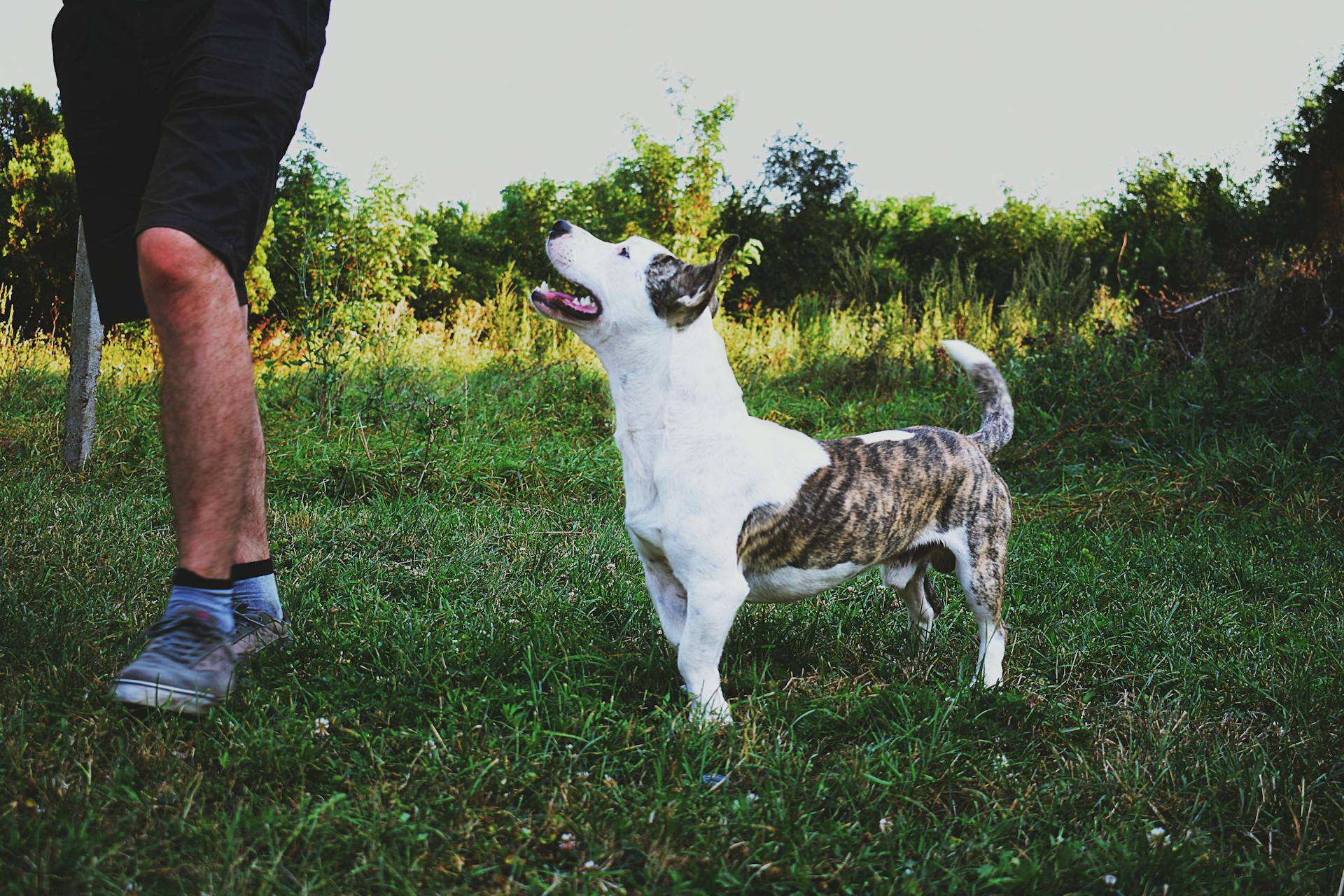
The Korean Jindo Dog Breed is a unique and fascinating topic. They are a rare breed, originating from the Jindo Island in South Korea.
Their distinctive appearance is characterized by a sturdy build, a broad head, and erect ears.
The Jindo's intelligence and loyalty make them a popular choice as a companion dog.
For your interest: Dogs Breeds That Start with B
Physical Characteristics
The Korean Jindo is a medium-sized breed, known for its sturdy and well-proportioned build. Adult Jindos typically stand around 18 to 22 inches in height at the shoulder and weigh between 35 to 50 pounds.
Their size, combined with their agile and athletic physique, makes them well-suited for their original purpose as hunting and working dogs in Korea. Jindos are double-coated spitz-type dogs with a keen and alert appearance that gives the impression of intelligence, strength, loyalty, and agility.
Their forward-pointing upright ears and muscular build make them a striking breed. Jindos are traditionally divided into two body types: Tonggol or Gyeopgae, and Hudu or Hotgae.
The back is strong and straight, and the loin is well muscled, taut, lean, and narrower than the ribcage.
Size

The Korean Jindo dog is a medium-sized breed with a sturdy and well-proportioned build.
Their height at the shoulder typically ranges from 18 to 22 inches, which is equivalent to 46 to 56 cm.
Adult Jindos usually weigh between 35 to 50 pounds, or 16 to 23 kg.
Their size, combined with their agile and athletic physique, makes them well-suited for their original purpose as hunting and working dogs in Korea.
Body
The Jindo's body is quite impressive, with two main body types recognized by the Korean National Dog Association (KNDA). The Tonggol or Gyeopgae type is more muscular and stocky, with a height to length ratio of 10:10.
This type has a more substantial build, with a chest depth that's roughly half the height at the withers. The loin is typically shorter, which gives the dog a more compact appearance.
The Hudu or Hotgae type, on the other hand, is more slender with a less deep chest and a slightly longer loin. This results in a longer appearance than it is tall, with a height to length ratio of 10:11.
On a similar theme: Xl Bully Height
The United Kennel Club also notes that the Jindo has a squarely built body, with a moderately deep chest that reaches to or just above the elbow. The brisket is well developed, and the ribs are well sprung.
Here's a breakdown of the two main body types:
The KNDA also recognizes a third body type called Gakgol, which is a combination of the two traditional types. This type retains the length of body of the Hudu and the depth of chest of the Tonggol.
Gait
The Jindo's gait is a remarkable aspect of its physical characteristics. The breed moves with strides of moderate length, which allows it to travel quickly over any terrain.
Its quick, light, elastic trot is a key feature of the Jindo's gait, enabling it to cover ground efficiently. This trot is so effective that it allows the Jindo to travel quickly over any terrain.
The Jindo's forelegs and hind legs are carried straight forward, with neither elbows nor stifles turned in or out. This helps the breed to maintain its balance and stability while moving.
At a normal walking speed, the Jindo tends to lower its head. This is a common behavior in dogs that are focused on their surroundings and moving at a steady pace.
Personality and Loyalty
The Korean Jindo is a breed known for its loyalty and gentle nature. They are notorious for being both loyal and intelligent, with a pack mentality that makes them easy to train.
Their intelligence also means they can be stubborn in the early stages of training, requiring patience and respect from their owners. Jindos are overall a gentle and loving breed, but they are wary of strangers and need early socialization to ease this concern.
One remarkable example of their loyalty is the story of Baekgu, a Jindo that escaped its new home and returned to its original owner after seven months. This loyalty can sometimes present itself as aggression in poorly socialized dogs, but with proper training and socialization, they can be loving and gentle companions.
Jindos are quick to train and can learn even the most complicated tricks and agility sequences with ease, but they do require frequent interaction with people or other dogs to keep them happy and healthy. They are of medium to high energy and need proper living space, walks, care, and attention to thrive.
You might like: How to Train a German Shorthaired Pointer to Hunt
Health
The Korean Jindo is generally a healthy breed with few serious genetic problems. One known health issue is hypothyroidism, which can cause hair loss, a dull coat, and weight gain, but is easily treatable with medication.
Their intelligence and loyalty make them great companions, but they do require attention and socialization to prevent boredom and destructive behavior. Early socialization is especially important to prevent aggression towards strangers.
Regular brushing is not necessary for Korean Jindos, but they do need regular ear cleaning and dental care to prevent periodontal disease. Daily brushing of their teeth can go a long way in keeping them healthy.
A consistent diet and regular exercise are crucial for maintaining a Korean Jindo's health. They require a high-quality diet and plenty of physical and mental stimulation to prevent boredom and destructive behavior.
Here are some key health considerations for Korean Jindos:
- Hypothyroidism: a common disease that can cause hair loss, a dull coat, and weight gain
- Periodontal disease: can be prevented with daily brushing of their teeth
- Ear infections: can be prevented with regular ear cleaning
- Tumors: can look like anything and should be checked out by a veterinarian
- Genetic predispositions: Korean Jindos are more at risk for certain health issues, but regular check-ups and care can help prevent or detect these issues early.
Remember, regular veterinary check-ups and a consistent care routine can go a long way in keeping your Korean Jindo happy and healthy.
Coat Color and Grooming
The Korean Jindo's coat comes in a variety of colors, with six recognized by the UKC: white, fawn, red, brindle, grey, and black, with some also sporting a black and tan combination.
Their coats are incredibly clean and require minimal bathing, thanks to their self-cleaning properties. They're often compared to cats in this regard, as they even groom themselves.
In fact, they shed profusely, especially during hot weather, due to their double coat. This can be a challenge for owners, but it's a trade-off for their low-maintenance grooming needs.
Living with a Jindo
Living with a Jindo requires a lot of attention and care, but it's worth it for their loyal and intelligent nature. They thrive on human interaction and can get bored and lonely if left alone for too long.
Jindos need patience during early training stages due to their high intelligence and stubbornness. Early socialization is crucial to prevent aggression and suspicion towards strangers. They are fiercely protective of their owners, so proper training is a must.
To keep your Jindo happy and healthy, establish a routine that includes regular exercise, a balanced diet, and regular grooming. Here are some essential tasks to include in your routine:
- Supervise your pet as you would a toddler.
- Brush your Jindo's coat at least weekly, daily during shedding season.
- Clean their ears weekly, even as a puppy.
- Keep their diet consistent and feed a high-quality diet appropriate for their age.
- Exercise your Jindo regularly, but don't overdo it at first.
Care and Lifestyle
Living with a Jindo can be a wonderful experience, but it requires some special attention to their needs. Jindos need to be allowed indoors, close to their owners, as they don't do well if left alone outside for long periods of time.
Their intelligence and loyalty make them form deep bonds with humans, but they can get bored and lonely if left alone, leading to destructive behavior. Early socialization is crucial to prevent aggression and suspicion towards strangers.
A Jindo's grooming needs are relatively low maintenance, but regular brushing is still necessary. They need a thorough brushing at least weekly, with daily brushing recommended during shedding season.
To keep your Jindo's teeth healthy, brush them at least twice a week. Cleaning their ears weekly, even as a puppy, is also essential.
Worth a look: Dog Breeds That Don't Need Grooming
A Jindo's diet should be consistent and high-quality, with no people food allowed. Feeding them according to their age and energy level is also crucial.
Here's a quick rundown of their exercise needs:
- Supervise your pet as you would a toddler.
- Keep doors closed, pick up after yourself, and block off rooms as necessary.
- Keep them on a leash outdoors, as they love to chase small animals.
- Exercise them regularly, but don't overdo it at first.
Remember, a tall fence is a must-have to prevent them from jumping and climbing great heights. With the right care and attention, your Jindo will thrive and become a beloved member of your family.
Children and Pets
Jindo puppies need to be socialized early if they will be exposed to children and other pets. This is crucial because Jindos are fiercely protective of their owners and can be suspicious of strangers.
A properly socialized Jindo becomes very confident, gentle, and tolerant, but they still don't appreciate being challenged. With proper training, they will not respond with aggression or violence.
Socialization is key when it comes to introducing Jindos to children and other pets. If you're unsure of how to properly train your Jindo, consider professional obedience training around six months of age.
Additional reading: Corgis as Pets
Jindos are naturally wary of strangers and don't take food from anyone other than their owners, which makes them great guard dogs. However, this also means they can be stubborn and independent.
Here are some tips for socializing your Jindo with children and other pets:
- Start early: Socialize your Jindo puppy as soon as possible to help them become confident and gentle.
- Be patient: Training a Jindo requires patience and consistency.
- Use positive reinforcement: Reward your Jindo for good behavior, such as calmly interacting with children and other pets.
Rescue and Recognition
The Korean Jindo is a unique and loyal breed that deserves our attention and care. Many Korean Jindos end up in rescue organizations or shelters due to changes in their owners' circumstances or abandonment.
If you're considering adopting a Jindo, it's essential to understand their independent nature and strong instincts, which may require patience and training for successful integration into a new home.
Rescue groups like Jindo Love Rescue, Treasured K9s, Two Dog Farms, and Free Korean Dogs are working tirelessly to provide a second chance at life to these amazing dogs. By rescuing a Korean Jindo, you not only provide them with a loving home but also contribute to their well-being and preservation as a breed.
If this caught your attention, see: German Shorthaired Pointer Free to Good Home
The Jindo is recognized by several kennel clubs, including the Fédération Cynologique Internationale, the United Kennel Club, and the American Kennel Club's Foundation Stock Service. They are also recognized by the Korean Kennel Federation, Korean Kennel Club, and participate in Jindo specialty shows held seasonally by local Jindo clubs.
Here are some reputable Korean Jindo rescue groups you can consider:
- Jindo Love Rescue
- Treasured K9s
- Two Dog Farms
- Free Korean Dogs
Rescue Groups
Rescue Groups play a vital role in giving Korean Jindo dogs a second chance at life. Many of these dogs end up in shelters due to changes in their owners' circumstances or abandonment.
Jindo Love Rescue, a notable organization, provides a safe haven for these dogs. Their efforts help the dogs adjust to a new home, considering their independent nature and strong instincts.
To successfully integrate a Korean Jindo into your home, patience and training are essential. These dogs are known for their unwavering loyalty and make devoted companions when given the love and care they deserve.
Here are some reputable Korean Jindo rescue groups you can consider:
- Jindo Love Rescue
- Treasured K9s
- Two Dog Farms
- Free Korean Dogs
By adopting from a rescue group, you not only provide a loving home but also contribute to the preservation of the Korean Jindo breed.
Kennel Club Recognition
The Jindo has made significant strides in gaining recognition from kennel clubs around the world. Internationally, it's fully recognized by the Fédération Cynologique Internationale and the United Kennel Club.
In the United States, the Jindo is under the Foundation Stock Service in the American Kennel Club, a crucial first step towards achieving full recognition.
The Kennel Club in the UK lists the Jindo in their Import category, indicating its growing popularity and acceptance in the global dog community.
In its country of origin, Korea, the Jindo is recognized by the Korean Kennel Federation, Korean Kennel Club, and local Jindo clubs hold seasonal specialty shows, further solidifying its status as a beloved breed.
For more insights, see: American Kennel Club Lancashire Heeler
Unique Breed Considerations
The Korean Jindo is a unique breed that requires special consideration. They need vigorous, frequent exercise and space to run, so if you're not an active person, this might not be the breed for you.
Their energetic nature can be both a blessing and a curse. If you don't provide them with enough physical and mental stimulation, they may become easily bored and find their own fun, which can lead to destructive behavior.
Here are some key things to keep in mind when considering a Korean Jindo as a pet:
- Requires vigorous, frequent exercise and space to run
- Territorial with larger dogs, especially of the same sex
- Easily bored and will find her own fun
- Has a tendency to escape, wander, and roam
- Independent and headstrong
- Standoffish toward strangers
Overall, the Korean Jindo is a loyal and loving companion, but they do come with their own set of challenges.
What a Unique Breed
Your Korean Jindo is a one-of-a-kind companion, and it's essential to understand their unique characteristics to provide the best possible care.
They're known for being devoted, loyal, and protective, which makes them excellent watchdogs. However, this loyalty can sometimes lead to a tendency toward dominance if not properly managed.
Here are some key traits to keep in mind:
- Devoted, loyal, and protective
- Good with children
- Lovable, playful companion
- Quiet—not much of a barker
- Excellent watchdog
- Energetic, active, and athletic
These characteristics require attention and exercise to keep your Jindo happy and healthy. They need vigorous, frequent exercise and space to run, which can be a challenge for some owners.
Their independent and headstrong nature can make training a bit more difficult, but with patience and consistency, they can learn to obey commands.
Key Considerations
When your Korean Jindo is showing signs of illness or discomfort, it's essential to recognize the warning signs.
Changes in appetite or water consumption can be a clear indication that your dog needs veterinary attention. This could be a sign of an underlying health issue, so it's crucial to monitor your dog's eating habits.
Tartar build-up, bad breath, red gums, and broken teeth are all signs of dental problems that require immediate attention. Regular dental care can help prevent these issues.
Itchy skin, hair loss, and excessive scratching can be a sign of skin allergies or irritations. Consult with your veterinarian to determine the best course of action.
Lethargy, mental dullness, and excessive sleeping can be indicative of a serious health issue. If you notice any of these changes in your dog's behavior, it's essential to seek veterinary help.
Here are some common signs that require urgent veterinary attention:
- Change in appetite or water consumption
- Tartar build-up, bad breath, red gums, or broken teeth
- Itchy skin (scratching, chewing, or licking), hair loss
- Lethargy, mental dullness, or excessive sleeping
- Fearfulness, aggression, or other behavioral changes
Frequently Asked Questions
Can you get a Jindo in America?
Yes, Jindos can be adopted in America, and you can help support their rescue efforts through donations or adoption
Is a Korean Jindo rare?
Yes, the Korean Jindo is a rare breed, with a limited presence outside of the Koreas. Its rarity is recognized by the South Korean Government, which has given it protective status.
Are Jindo dogs friendly?
Jindo dogs are loving and loyal to their known loved ones, but can be reserved and quiet around strangers. They may initially appear aloof, but are actually friendly once you get to know them.
Is a Korean jindo a good family dog?
The Korean Jindo Dog is a loyal and intelligent breed that makes a great household pet, especially for families who value quiet companionship. They're a great choice for families who want a low-maintenance yet loving companion.
Do Korean jindos bark a lot?
Korean Jindos are generally quiet dogs, but when they do bark, it's often loud and deep. They're not excessive barkers, but their barks are attention-grabbing and worth understanding.
Featured Images: pexels.com

